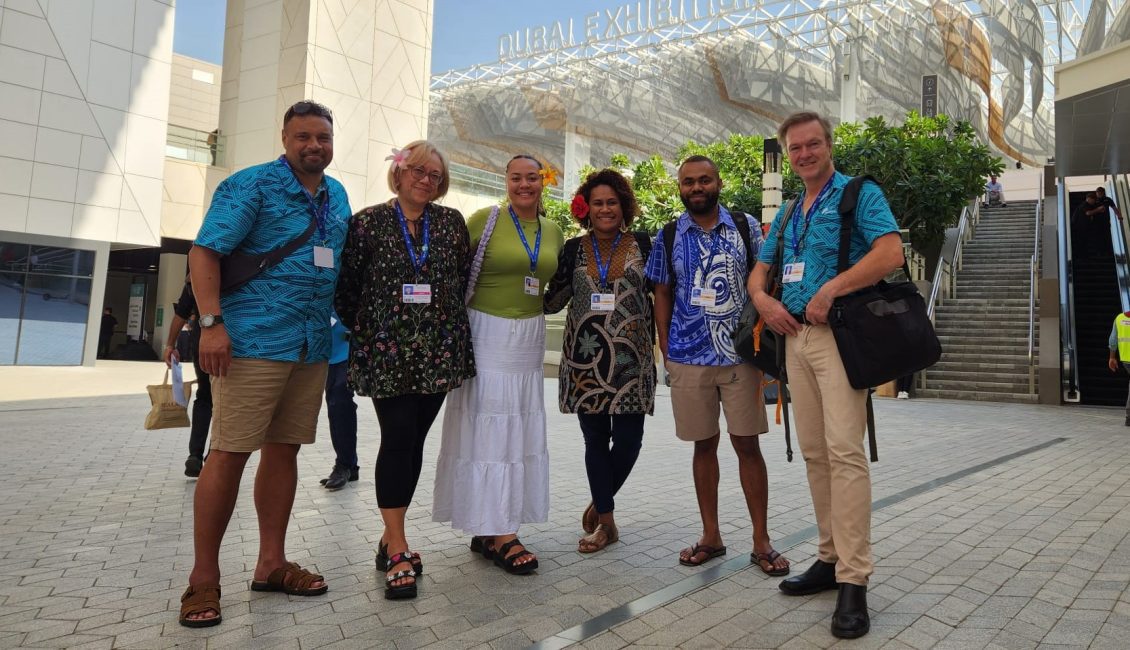
Pasifika TV team in Dubai along with Nanette Woonton from SPREP. L to R: Junior Hunter, Nanette Woonton, Mareva Cameron, Amelia Rigsby, Jone Tomuse, Karl Schodt.
The 2023 United Nations Climate Change Conference (COP28) is being held at the Expo City in Dubai from November 30th until December 12th and is the largest climate change conference in the world. This event will see world leaders convene to discuss and set a course to collectively address the rising danger of climate change.
With so many Pacific nations acutely vulnerable to the world-changing impacts of climate change, a seat at the table and representation of Pacific voices has never been so vitally important. Communicating what happens at COP28 is just as important and by doing so the media holds world leaders accountable for the promises they make.
To help tell stories of such importance, Pasifika TV are sending a regional reporting crew to COP28 who were selected from Pacific Cooperation Broadcasting Limited’s (PCBL) 2023 Pacific Regional Journalism Training Programme. The programme took place over eight weeks and included sessions on climate change reporting by Nanette Woonton, Communications and Outreach Adviser for SPREP, and Sosikeni Lesa, Media and Public Relations Officer for SPREP.
The team of four are:
- Amelia Rigsby – TV Producer & Host, FBC, Fiji
- Jone Tomuse – TV Producer, FBC, Fiji
- Mareva Cameron – News Producer, CITV, Cook Islands
- Sinivar Kasimani – Producer, NBC, Papua New Guinea
We asked the team what they wanted to achieve at COP 28 and the importance of Pacific representation in the discussion of climate change.
Amelia: My ultimate goal is to relay information and outcomes that directly affect my Pacific brothers and sisters in a way that is easy to understand. But also tell the stories of those Pacific Islanders who are at COP28 – why are they there? What are they hoping to achieve or see achieved?
Jone: Having people from the Pacific region reporting on COP28 is essential for a holistic and effective global response to climate change. [Our] insights, experiences, and advocacy can contribute significantly to shaping climate policies, fostering global cooperation, and addressing the unique challenges faced by the Pacific.
Mareva: My passion for our environment and the wellbeing of my Pacific brothers and sisters runs deep. Having people from the Pacific report back the discussion and findings from COP28, back to our region and on their home screens is of dire importance because if we aren’t, who will?
Sinivar: The fight against climate change continues in the Pacific region. We can see that the world is not on track to meeting the Paris Agreement goals, and with COP28 it is hoped that governments will try to accelerate climate change action. I know that what I report will reach everyone back home and give hope that our leaders are making this a priority.
As always, make sure to check in with your local broadcaster to see when Pasifika TV’s coverage of COP28 will be on your channel. Keep an eye on our website and Facebook page for Pacific-led stories about the ongoing fight against climate change!





